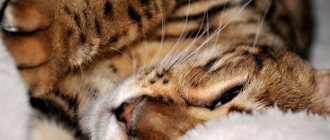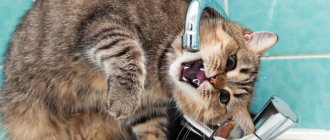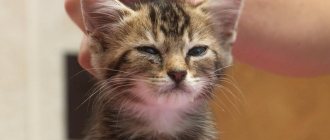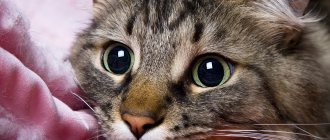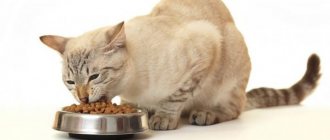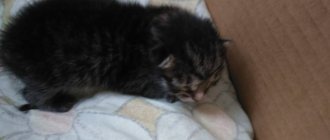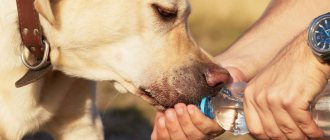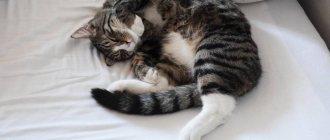Cats are, in most cases, selective about their food choices. Owners can spend a lot of time studying the preferences of their pets. By observing cats eating food, we can draw a conclusion. They slowly absorb food and do not eat what they do not like. The owners can only satisfy the requirements of the pet and monitor its health. The first sign that your cat is not well is when your cat refuses to eat for 3 days or more. Do not rush to sound the alarm, there are many reasons why a cat does not eat anything.
Reasons for refusing food only
Reasons why the animal does not eat:
- hormonal surge;
- infection with external or internal parasites;
- stress;
- transfer to new and unusual food;
- dirty bowl;
- diseases of internal organs;
- hot weather;
- the stomach is full of wool;
- viral or bacterial infections;
- anorexia;
- poisoning.
Transfer to new or unusual foods
If a cat refuses to eat, then the reasons may be a change in diet or diet:
- cats do not like changes in food, a certain taste and smell is a guarantee of the quality and safety of food;
- cats are predators, cold food is unusual for them;
- If an animal is accustomed to artificial food enriched with additives and flavorings, it will probably refuse a less odorous treat.
Stress
Cats are emotional animals and react painfully to changes in the atmosphere at home:
- there are many animals or strangers in the house;
- repair;
- visiting a veterinarian;
- moving;
- illnesses, injuries and operations;
- external and internal parasites;
- obesity;
- death of a family member;
- jealousy;
- fear, melancholy, loneliness;
- addition to the family.
Hot weather
The following suffer most in hot weather:
- long-haired shaved cats;
- short-nosed breeds;
- animals with chronic diseases of the cardiovascular system;
- obese pets;
- animals over 8 years old.
Cats love warmth - they need to maintain their energy potential. They have no sweat glands on their bodies. Cats cannot evaporate moisture and cool themselves. They cannot feel this, since they lack thermoreceptors, and can quickly overheat. Before the onset of hot weather, you should consult your veterinarian. He will prescribe medications in case your pet becomes ill.
Dirty bowl
What does dirty cat dishes lead to:
- clean cats completely refuse to eat or drink when the bowl is infested with ants and foreign odors;
- It is dangerous to feed less squeamish pets from dirty dishes due to infection.
It is necessary to wash bowls after meals or at least once a day - this will protect them from the source of pathogenic bacteria.
Hormonal surge
Factors causing hormonal surge:
- puberty;
- estrus;
- pregnancy.
If an animal is going through a period of sexual activity, it may forget about food for a whole week. This does not mean that the cat is sick. After a maximum of seven days, your appetite should return. If your cat's appetite has not returned after the effects of the hormones have ended, you should contact your veterinarian for vitamins.
Helminthiasis or the presence of external parasites
The danger comes from the toxic waste products of worms and fleas. If the animal is not treated, its condition quickly deteriorates - the number of parasites grows exponentially.
Typical signs of a parasitic infection:
- itching;
- cough;
- poor sleep;
- diarrhea and vomiting.
Stomach is full of wool
If long-haired animals are not combed, they lick the fur with their rough tongue and swallow it. A lump collects in the stomach, which interferes with the digestion of food. The cat develops diarrhea and vomiting, and the animal refuses to eat.
The video from the channel “Network of Veterinary Clinics Bio-vet” talks about some of the reasons for poor appetite in cats.
Viral or bacterial infections
Even domestic cats that do not roam outside are susceptible to infections. Many bacteria and viruses enter the home on the hands and soles of shoes. The most common of these are feline herpes and calcivirus.
Typical signs after the incubation period appear as follows:
- the pet is lethargic and sad;
- the animal is not active and sits in one place;
- sneezes;
- his nose is running;
- vomits with mucus and blood;
- ulcers appeared in the mouth and nose;
- the eyes become inflamed, thick mucus is released;
- there is fever and temperature;
- The animal does not drink water and dehydration develops.
You cannot let the disease take its course and self-medicate. Effective treatment should only be prescribed by a veterinarian so that the consequences for the pet’s health are minimal.
Anorexia
Causes of the disease:
- Stomatitis, diseases of the oral cavity that interfere with the absorption of food.
- Nausea - food stays in the stomach for a long time and irritates the chemo- and mechanoreceptors. The cat loses its appetite and is in constant pain.
- Infectious and inflammatory processes.
- Tumors can cause intestinal obstruction, constant pain and the growth of metastases in the liver.
- Anorexia can be caused by taking antibiotics, painkillers and diuretics.
- It can also be caused by diabetic ketoacidosis, pulmonary or heart failure, and uremia.
- Antitumor therapy has a toxic effect on enterocytes, stimulates chemoreceptors and causes nausea. As a result of its action, the cat loses its sense of taste.
- Lipidosis, cholangiohepatitis and infectious diseases of the liver and intestines.
- Pancreatitis and diseases of the gastrointestinal tract occur with vague symptoms, but always with drowsiness and refusal to eat.
Diseases of internal organs
The reasons for refusing food can be diseases of the cardiovascular system: difficulties in the functioning of the heart, its increase or decrease.
At first it is impossible to detect the disease, but later the following symptoms appear:
- dyspnea;
- metabolic disorders;
- cough;
- apathy;
- difficulty standing upright.
Respiratory diseases, such as:
- bronchitis;
- rhinitis;
- pleurisy;
- emphysema;
- bronchopneumonia;
- laryngitis.
Symptoms may include the following:
- the animal sneezes;
- coughs (sometimes with blood);
- a runny nose appears;
- possible attacks of vomiting interspersed with blood;
- breathing may be difficult and signs of asthma may appear.
Respiratory system disorders can be caused by hypothermia and allergies.
Also, the cause of poor appetite can be diseases of the gastrointestinal tract, such as:
- mumps;
- peritonitis;
- gastritis;
- pharyngitis;
- poisoning.
The symptoms are as follows:
- runny nose;
- mucus from the mouth;
- enlarged lymph nodes;
- difficulty breathing and chewing.
Stomach ulcers can also affect your pet's appetite.
Typically the symptoms of an ulcer are:
- the cat vomits (possibly with blood);
- he is hiding;
- meows;
- defecates frequently;
- doesn't eat;
- I lost a lot of weight.
Signs of a cat's illness can be learned from the video provided by the Children of Fauna channel.
Fasting days
If the cat is nervous or upset, it may refuse to eat for the day. Already on the second day, as a rule, appetite returns to normal. The owners don't need to worry.
Poisoning
Signs that a cat has been poisoned:
- the cat does not eat or drink, there is vomiting;
- the pet is lethargic, weak, just lying down;
- elevated temperature;
- internal and external bleeding, hematomas;
- anemia of the mucous membranes;
- seizures, inappropriate behavior.
The sooner the cat is taken to the clinic, the better. The likelihood of salvation increases if the owner knows exactly what kind of poison the animal was poisoned with.
Oncology
Symptoms of cancer:
- tumors, swellings, bumps on the skin;
- non-healing wounds;
- discharge from the eyes, nose, mouth, anus;
- bad breath;
- the cat is lethargic, barely walks, behaves unusually;
- looking sickly and thin;
- the animal suddenly begins to limp;
- diarrhea and vomiting appear;
- hyperemia on the skin (may peel off);
- decreased or loss of appetite;
- dyspnea;
- The cat doesn't go to the litter box much.
Veterinarians have invented a vaccine against the leukemia virus, and therefore against lymphosarcoma. The sooner the owner receives advice from a veterinarian, the higher the likelihood of maintaining the health of the pet.
Something hurts
Reasons for refusing to eat:
- the cat loses its appetite due to pain;
- A lot of energy is spent on absorbing and digesting food, which a sick animal does not have.
Kidney failure
Signs that your cat is sick:
- starts drinking more;
- not active, lethargic;
- loss of appetite, vomiting appears;
- the animal is losing weight;
- hair falls out;
- My breath smells strongly of acetone.
Foreign body
Symptoms that will help you understand that your cat has swallowed something inedible:
- Vomiting and diarrhea.
- If an object moves through the gastrointestinal tract and injures it, black feces are observed.
- With partial patency, the animal can carry a foreign object in itself constantly. This causes vomiting, dehydration and dull fur.
If the object ruptures the walls of the esophagus or causes pneumothorax (air entry), the animal will die.
The video from the channel “Children of Fauna” tells what to do if a cat swallows a foreign object.
Dangerous symptoms
The presence of discharge from the nose of a fluffy indicates the development of a serious illness.
If a small kitten does not eat anything, constantly meows and does not play because it is in a different environment, there is nothing dangerous in such a situation. As soon as the baby gets used to it, sniffs and gets to know all the family members, he will calm down, and his appetite will certainly return soon. It’s another matter when the cub feels bad for unknown reasons. If any dangerous disease develops in the body, in addition to lack of appetite, other pathological symptoms will also bother you:
- increased body temperature;
- copious discharge from the nose and eyes;
- increased salivation;
- repeated vomiting;
- diarrhea or constipation, bloating, pain when pressing on the abdomen;
- refusal of water;
- blanching of the mucous membrane;
- presence of foreign matter in feces;
- lethargy, drowsiness, while the cat does not get up all day.
How many days without food is considered normal for cats?
Normally, fasting can last a different number of days depending on the reason:
- During the day, a cat can starve without harm to health in the hot season, while it consumes more water;
- also, no more than a day is considered normal fasting after moving;
- stress from changing ownership can also cause loss of appetite;
- meeting dogs on the street can become a stressful situation for a cat and also cause poor appetite;
- stress or manipulation performed by a veterinarian during a visit to the clinic can also affect the animal’s appetite;
- The cat may not eat for two days after anesthesia;
- during the release of hormones, the cat can eat on the third day;
- cats periodically refuse food and water altogether for several days during pregnancy.
For kittens
If a kitten under the age of six months is lethargic, does not play, sleeps a lot and has no appetite at all, then this is an alarming sign. The younger the animal, the faster all processes in its body proceed. For kittens under 6 weeks of age, going without food for even 12 to 24 hours can cause death. New owners often experience starvation of their pet when they take it home when it is two or three months old.
Reasons for fasting:
- too young and not ready for solid food;
- separation from mother;
- stress;
- change of home decor.
For cats and cats
If a young cat eats poorly for several days for no apparent reason and only drinks water, then most likely the animal is sick. He can cope with the infection, or there will be a remission of a chronic disease. Usually after this the owners stop worrying. But we need to fight not the symptoms, but the causes of the disease. To do this, it is imperative to contact a veterinarian, find out what exactly is happening to your pet and prescribe a course of treatment.
For a pregnant cat
While waiting for kittens, cats develop the following characteristics:
- Pregnant cats, like women, experience toxicosis. In the morning there is loss of appetite, nausea and vomiting.
- The pet becomes selective in food; she may be offered her favorite treats, but she refuses them. You need to buy specialized food for pregnant cats with a high content of micro- and macroelements.
- As the belly grows, pressure in the abdominal cavity increases and appetite decreases. From the 3rd week of pregnancy, the cat is fed 5-6 times a day in small portions. The food is wiped and soaked for absorption, and the amount of water is increased.
- When the cat refuses to eat at all, birth is expected soon.
- Refusal to eat in combination with fever, weakness and an unpleasant odor from the vagina of a pregnant cat is a reason to urgently consult a veterinarian.
For old cats
As cats age, their digestive organs wear out.
Typical diseases and problems appear:
- gastritis;
- enteritis;
- dysbacteriosis;
- diarrhea;
- constipation;
- change in stool color;
- vomiting, fasting;
- stomach ache;
- weight loss.
Prevention
To prevent your pet from refusing to eat, the following simple measures should be followed:
- normalize diet;
- do not allow the cat to be outside uncontrolled;
- diversify your diet;
- feed the animal only premium and super-premium mixtures;
- exclude food from the human table;
- choose food in accordance with the cat’s taste preferences;
- avoid stressing the animal;
- sterilize your pet in time or provide him with a full sex life;
- carefully transfer to a new diet, especially kittens;
- prevent the animal from overheating in the hot season;
- vaccinate annually;
- regularly deworm and treat for external parasites;
- Long-haired breeds should be combed out and given pastes to prevent the formation of hairballs;
- Bring your pet to the veterinarian regularly for checkups.
1111
What to do if you don’t eat or drink for a long time?
By drinking water, the animal will survive for 10 days. Without food and water, a cat will live a maximum of 6 days, depending on its age.
Kitty
Kittens are rescued in 2 ways:
- find a wet nurse - a recently lambed cat for surrogate feeding;
- fed from a syringe/bottle with an artificial mixture of diluted cat milk.
Adult cat or cat
You should not change food without the advice of a veterinarian. It needs to be heated, crushed and given in small portions. It is recommended to gradually switch to food for elderly pets, and to add a vitamin-mineral complex and vegetable oils to natural food.
The following are contraindicated for cats:
- salty;
- roast;
- fatty.
Catnip added to water stimulates appetite.
How to feed an adult cat
Force feeding of an adult cat is carried out only as prescribed by a veterinarian. Quite often, in order not to overload the animal’s intestines, the doctor prescribes subcutaneous and intravenous infusions of nutrient solutions.
When it comes to the fact that the cat can, but does not want to eat, you need to try to provoke hunger. The main tools are:
Smell - there is a saying: “appetite comes with eating,” but in fact, the desire or reluctance to eat something depends on the attractiveness of the smell. As a stimulant, you can use gravy from industrial feed.
My own example - eat in front of the cat and place a bowl with treats for the cat nearby. Food should be soft. Proceed as follows: take a sandwich (or other food) in your hand, slowly bite off a piece and begin to chew slowly. Put the sandwich aside and use the same hand to scoop some cat treats onto your finger and let your pet sniff. Watch the reaction; if the cat licks its lips, you are acting correctly. If the cat begins to quickly swallow saliva, this is a sign of nausea and force feeding is inappropriate. If your cat has nausea, you can try other, neutral products or you need to switch your pet to nutrient solutions.
Any liquid, homogeneous food can be given to the cat through a syringe or piston dispenser (for children). To avoid vomiting, give food little by little, 5-7 ml at a time. Repeat feeding every 1–1.5 hours and monitor your pet’s condition. In case of vomiting or indigestion, replace food with rice water and ground, boiled rice porridge.
When exactly should you take your pet to the doctor?
If a cat is fasting for more than 4 days, then this is a good reason for concern and prompt consultation with a doctor.
Alarming symptoms:
- the cat is breathing heavily, screaming;
- dry and hot nose;
- vomiting and diarrhea are observed;
- changes in appearance and behavior: the cat has lost a lot of weight and hardly moves;
- discharge and changes in the condition of the coat.
It is very important to go to a veterinary clinic and not self-medicate, so as not to harm your pet and begin proper treatment as soon as possible.
Binge Alcoholic
Family and loved ones often suffer more from this problem. How to behave correctly with an alcoholic in order to prevent losing yourself in the eternal struggle with the “green serpent”?
If the husband is a binge alcoholic
First of all, a woman with an alcoholic husband should clearly understand for herself - is she ready to spend her life and show her children an example of an unhealthy relationship in order to cure an addict? If the answer is yes, then it is important to remember the following rules:
- scandals and hysterics will never convince a man of the need for treatment;
- It is unacceptable to have arguments and conversations with a drunk, do not carry on a conversation with him, and never drink with your alcoholic husband.
- do not try on the role of a mother - you should not pay off debts for a person, solve problems with work, drag someone to sleep from the floor to the bed, or help them get home;
- if the husband himself realizes the scale of the problem, help him - talk about it, create a calm environment at home, do not create reasons for quarrels.
- Be consistent and calm - no empty threats about leaving. If you decide to leave, you need to do it in reality, and then stand your ground.
- If things have gone too far and the alcoholic begins to use force or has hallucinations, immediately take the children and go to a safe place. Alas, this stage can rarely be cured, but the psyche of others may suffer.
- If your spouse works, loves his wife and children, but periodically starts drinking, try to call him for a calm conversation. Perhaps he has problems that he is trying to hide. Instill in him that alcohol will not solve the problem, and you will support him in any situation. In a family, it is important to be able to discuss all problems.
At the same time, you should not throw your husband hysterics if he decided to drink a couple of beers with dinner on Saturday - this is not an indicator of alcoholism. You should be wary only if the frequency of such days and the amount of drinking inexorably increases.
How long do binge alcoholics live?
This question cannot be answered unambiguously. It all depends on the condition of the body. For example, a person with a strong heart and kidneys can drink almost until old age. The most common deaths among these are accidents or fights.
Former binge alcoholics
There are no former alcoholics, like drug addicts. Such people are in a state of remission, even if they never again take alcohol or inject themselves for the rest of their lives. The addict himself must understand that the fight against the desire to drink will be almost constant if he does not engage in his favorite hobby. Many people benefit from changing nervous work to calmer work. It is especially important to regularly attend special sessions with a psychotherapist. They are not needed for crazy people at all - the doctor, in a conversation, will help identify psychological problems and work through them. The method of psychotherapy is also used in the treatment of drug addicts.
Detoxification in hospital
Most often, the sickest patients are admitted to the hospital for long periods of time. Here we are talking not only about restoring sobriety, but also about restoring internal organs and the psyche:
- removing alcohol from the body using droppers; if alcohol has been consumed recently, then gastric lavage is also used;
- injections of vitamin preparations, sedatives, glucose;
- to relieve withdrawal symptoms, mild antidepressants, B vitamins and antipsychotics are selected individually;
For further treatment, therapy is also selected individually; these can be group classes or sessions with a psychotherapist. For physical recovery and calm, massage, acupuncture, and electrophoresis procedures are used.
WITHDRAWAL FROM BINGE BINGE IN THE CLINIC
